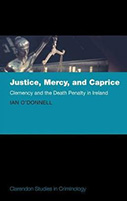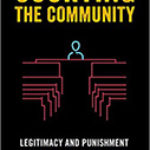Justice, Mercy, And Caprice: Clemency And The Death Penalty In Ireland

Author: Ian O’Donnell
Publisher: Oxford, UK: Oxford University Press, 2017. 320p.
Reviewer: Muzzaker Mathias | March 2020
If you were granted clemency on the day of your execution would you want to know why? Why” are some spared while others [pay] the ultimate price?” (p. xii). Ian O’Donnell attempts to answer these questions in the Irish context, with a history of capital punishment titled Justice, Mercy, and Caprice: Clemency and the Death Penalty in Ireland. What follows is a ‘compelling account of the exercise of discretion’. Spanning from post-independence in 1923 to the country’s abolition of the death penalty in 1990, the book assesses how gender, politics, religion, and more international relations influenced the law and contributed to the emergence of a more humane Irish state.
Ian O’Donnell is Professor of Criminology at University College Dublin, a fellow at Linacre College of the University of Oxford, and a former Magistrate on the Oxford Bench. He is also a Chartered Psychologist and served as Director of the Irish Penal Reform Trust. He has written extensively about capital punishment and criminal justice reform in Ireland for both academic and popular publications. His previous book, also with Oxford University Press, was on the related topic of Prisoners, Solitude and Time in 2014.
O’Donnell takes a staunch stance against capital punishment, which sets both the tone and the theoretical framework for the rest of the book. The opening quotation from Arthur Koestler, a former prisoner, argues that, “the gallows is not merely a machine of death [but also] drives towards moral self-destruction.” O’Donnell distinguishes between three types of clemency to show how Ireland moved away from such self-destruction:
- Acts of ‘justice’ individualised punishment to meet the offender’s circumstances by taking variations of culpability and harm into account (p. 41).
- Acts of ‘mercy’ softened punishment out of compassion for the offender’s plight (p. 41). Over time, such acts became the standard, as legal norms regarding punishment softened internationally
- Acts of ‘caprice’ often resulted from unforeseen events such as the influence of a bishop or senior judge petitioning for strategic reasons (p. 43).
This categorization of the various motivations behind acts of clemency helps the reader better understand how the death penalty functioned within a particular socio-political context. O’Donnell’s meticulous evaluation of primary sources reveals not only how, but why some people were spared the death penalty in Ireland. These sources include prisoner files, court transcripts, government memoranda, interviews, the writings of citizens and public servants, and more. As much can be learned from the cases of those put to death by the state as from those who were spared. The book presents specifics from both 49 commutations and 29 executions (p. 263-7). O’Donnell’s conclusions are carefully made and well-founded, but he is also quick to acknowledge when there is not enough evidence to provide answers.
A strength of this book is its extensive twenty tables identifying the many variables affecting legal outcomes, such as ‘murder methods’, ‘geography’, ‘speed of jury deliberations’, ‘merciful ministers’, and months in ‘coercive confinement’. While some may fear that such minutiae might come at the expense of the reader’s interest, O’Donnell’s account does not bore. Often, the most fascinating parts of the history are in the details themselves: from the description of the hangman’s tools – a ruler and measuring tape (p. xii) – to the drama of a letter from the President, who breached the bounds of the constitution to ask for Michael Manning [the last man put to death in Ireland] to be spared (p. 177-79). Perhaps the most compelling narrative is found in O’Donnell’s description of the secret non-jury military courts that executed IRA militants.
In 307 pages this volume presents an authoritative account of clemency in Ireland. It also acts as a “midwife for more empirically or theoretically elaborate work” (p. 14). In addition to fostering debate for future scholarship, especially regarding what can be learned about Irish law through the study of capital punishment, the book also raises important questions about the role of gender in the adjudication of punishment. O’Donnell relates the paternalistic view that women “could not be held fully accountable for their actions” (p. 99) to the fact that half of men were executed after trial by jury in comparison to one in ten women (p. 30).
The book’s usefulness is not just contained to Ireland. Rather, much can be learned from an in-depth study of a country about which factors can predict an increase in the use of capital punishment in any context internationally. In Ireland’s case, the death penalty was practically obsolete by 1914 (p. 7). It was only after the World Wars and Irish national independence that a “willingness to resort to judicial execution” re-emerged.
O’Donnell argues that the psychological impact of wars can produce a collective devaluation of and disregard for human life. When the Irish state felt it was under threat, it decided to use more violence to protect itself. One manifestation of this fear was the misdirected decision to resume regular use of the death penalty. Interestingly, those who the state argued were the ‘cause’ of the need to return to the death penalty were ultimately less likely to suffer under its effects. O’Donnell finds that “the chaotic domestic killer was more likely to be executed than the armed, organised insurgent” despite the state often justifying its use of capital punishment with ‘‘rhetoric about crushing the IRA” (p. 32). Fewer than one in three were executed for politically motivated murders while around half were executed for non-political murders. These figures point to a serious failing of distributive justice in Ireland’s history, leaving lingering questions of where else this might be the case.
O’Donnell also analyses how political climate can affect outcomes in capital punishment cases. Michael Manning, who was the last man to be put to death in Ireland in 1954, would likely not have been hanged if there had not been an upcoming election. O’Donnell’s finely detailed descriptions of these government proceedings reveal that they were often conducted in secret, with no review or explanations given (p. 54). He compares the resulting arbitrariness and lack of due process to the presidential pardoning process in the United States. He argues that such “abuse of executive power” and “inegalitarianism” is “offensive to right minded people” (p. 67).
One of the most interesting sections of this book considers the release of prisoners. It pays attention to the period from Ireland’s final execution in 1954 to the ban of the practice in 1990. After 1964, in cases of capital murder, every death sentence was commuted to a term of forty years (p. 225). However, by the 1970s, seven-and-a-half years was the average time served for capital offences (p. 229). O’Donnell uses his considerable knowledge and expertise on the subject matter to offer his assessment of why and how prisoners were released on licence. There is some repetition in this book, but it is generally helpful given the sheer amount of information being covered.
To conclude, Justice, Mercy, and Caprice: Clemency and the Death Penalty in Ireland presents detailed research on clemency in an engaging way, while also contributing to the larger field of law and penology in Ireland and beyond. In his expansive discussion of capital offences and punishment, O’Donnell reminds us of a “barbarous past” (p. xv) and carries the torch forward by prompting further research and deepening our understanding of complex legal concepts. This book will be useful to legal scholars, historians, sociologists, criminologists, abolitionists, and any laypeople who seek to drive their home countries away from practices rooted in cruelty and caprice, and towards policies rooted in justice and mercy.
Muzzaker Mathias is a prisoner at HMP Grendon


